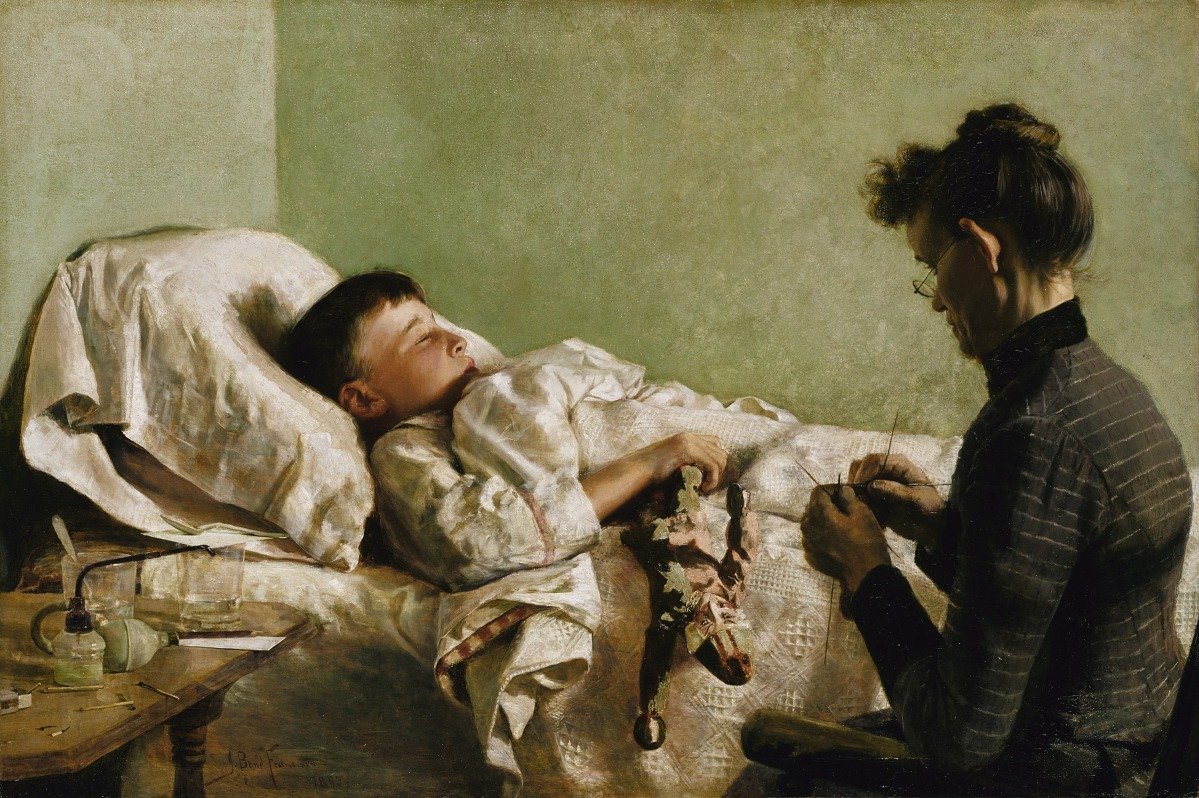Doctors Are Not Supposed To Panic
Rosalind Coleman
J. Bond Francisco, The Sick Child, 1893
Word Count 636
Doctors are not supposed to panic.
I was certain that the boy was sick enough to be admitted, although I didn’t know what was wrong. Ben, the surgical resident, disagreed. “Just a tummy ache,” he said dismissively, and it was true, the boy hardly winced if you pressed on his stomach, and his X-ray looked so normal that we didn’t even bother waking up the radiology resident to confirm.
That was my first mistake. It was 1972 and women’s welcome in medicine was grudging, even in pediatrics, so I hesitated to oppose Ben – a large man who towered over me and sniffed in a way I felt to be degrading. He said I was dithering. He had six years of experience to my three, so I didn’t persist in my objections or demand that the surgical attending come in from home to consult. That was my second mistake. All I could imagine was that the attending would also see me as weak and incompetent. A female doctor, wringing her hands over nothing. I wondered later whether Ben, too, might have feared being viewed as less than competent, as though asking for advice would seem too womanly.
Even so, the child looked so drawn and moved so little, that I decided to admit him for observation. We filled out the admission forms and wheeled him up to the pediatric ward.
It was now three in the morning. The corridors were empty, and the wheels of the stretcher clanked on the tile floor. The ward was otherwise still with just a few muffled coughs and an occasional groaning breath. Everyone was asleep except for Bettina, the night nurse.
My junior resident and the intern were busy performing a lumbar puncture on a tiny baby with meningitis. I wheeled my patient into the second treatment room to replace the IV dripping sugar solution that had come out during the transit from the ER. I felt hardly awake as I stumbled around the stretcher, slapping the backs of the boy’s hands and feet to try to make a decent vein appear. I could find nothing large enough to insert a needle into. Even the tiniest veins weren’t filling.
Why not? Why were no veins visible? His hands looked white like those of a marble statue in a winter garden. His face, too, was pale and chilled, and his open eyes were unfocussed. He looked as though he were only a sigh away from death. In total horror, it came to me that the boy was in shock.
“Bettina!’ I screamed into the silent corridor. “Help me! Get the surgeons! Someone come!”
My heart pounded in my ears, and my hands trembled as I grabbed at a bottle of colloid on a high shelf. It slipped from my grasp and smashed on the tile floor. Sticky liquid puddled under my shoes and shards of glass were everywhere.
Ben ran from the ER and did a rapid cutdown to get to a vein. I gave the child a drug to raise his blood pressure, and I started gentamycin. Ben called the operating room to get a crew assembled. Then the radiology resident phoned to scream at us that we were idiots to have missed the black shadow of air under the diaphragm, the X-ray sign of a perforated bowel. Now it was obvious: the boy’s appendix had ruptured, allowing fecal matter to spread throughout his abdomen and gut bacteria to course through his blood stream. We had missed it. We had missed everything. Quickly, blood was typed and crossed, and the boy was rushed to the OR.
My heart was still racing and my hands shaking as I dropped into a chair at the nurses’ station to write my notes. I felt that we were all damned lucky. The boy, too. He survived.
